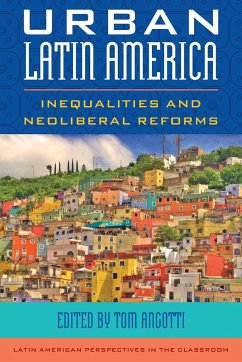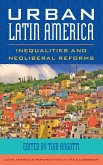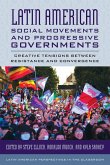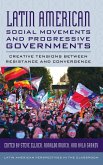Urban Latin America
Inequalities and Neoliberal Reforms
Herausgeber: Angotti, Tom
Urban Latin America
Inequalities and Neoliberal Reforms
Herausgeber: Angotti, Tom
- Broschiertes Buch
- Merkliste
- Auf die Merkliste
- Bewerten Bewerten
- Teilen
- Produkt teilen
- Produkterinnerung
- Produkterinnerung
Latin America, one of the most urbanized regions of the world, can only be fully understood by exploring its urban-rural divide, inequalities within urban areas, and the prospects for change. This thoughtful text explores Latin American cities; their history, similarities, and differences; and the current problems they face.
Andere Kunden interessierten sich auch für
![Urban Latin America Urban Latin America]() Urban Latin America134,99 €
Urban Latin America134,99 €![Latin American Social Movements and Progressive Governments Latin American Social Movements and Progressive Governments]() Latin American Social Movements and Progressive Governments51,99 €
Latin American Social Movements and Progressive Governments51,99 €![Latin America's Radical Left Latin America's Radical Left]() Latin America's Radical Left163,99 €
Latin America's Radical Left163,99 €![Visibilities and Invisibilities in Smart Cities Visibilities and Invisibilities in Smart Cities]() H. Patricia McKennaVisibilities and Invisibilities in Smart Cities229,99 €
H. Patricia McKennaVisibilities and Invisibilities in Smart Cities229,99 €![Latin America's Pink Tide Latin America's Pink Tide]() Latin America's Pink Tide109,99 €
Latin America's Pink Tide109,99 €![Latin America's Radical Left Latin America's Radical Left]() Latin America's Radical Left63,99 €
Latin America's Radical Left63,99 €![Latin American Social Movements and Progressive Governments Latin American Social Movements and Progressive Governments]() Latin American Social Movements and Progressive Governments115,99 €
Latin American Social Movements and Progressive Governments115,99 €-
-
-
Latin America, one of the most urbanized regions of the world, can only be fully understood by exploring its urban-rural divide, inequalities within urban areas, and the prospects for change. This thoughtful text explores Latin American cities; their history, similarities, and differences; and the current problems they face.
Hinweis: Dieser Artikel kann nur an eine deutsche Lieferadresse ausgeliefert werden.
Hinweis: Dieser Artikel kann nur an eine deutsche Lieferadresse ausgeliefert werden.
Produktdetails
- Produktdetails
- Latin American Perspectives in the Classroom
- Verlag: Globe Pequot Publishing Group Inc/Bloomsbury
- Seitenzahl: 306
- Erscheinungstermin: 17. August 2017
- Englisch
- Abmessung: 229mm x 152mm x 18mm
- Gewicht: 500g
- ISBN-13: 9781442274488
- ISBN-10: 1442274484
- Artikelnr.: 48140603
- Herstellerkennzeichnung
- Books on Demand GmbH
- In de Tarpen 42
- 22848 Norderstedt
- info@bod.de
- 040 53433511
- Latin American Perspectives in the Classroom
- Verlag: Globe Pequot Publishing Group Inc/Bloomsbury
- Seitenzahl: 306
- Erscheinungstermin: 17. August 2017
- Englisch
- Abmessung: 229mm x 152mm x 18mm
- Gewicht: 500g
- ISBN-13: 9781442274488
- ISBN-10: 1442274484
- Artikelnr.: 48140603
- Herstellerkennzeichnung
- Books on Demand GmbH
- In de Tarpen 42
- 22848 Norderstedt
- info@bod.de
- 040 53433511
Edited by Tom Angotti
Part I: Poverty, Informality, and Peripheral Cities Chapter 1: Urban Latin
America: Periphery, Informality, and Inequality Tom Angotti Chapter 2:
Poverty, Inequality, and Informality in the Latin American City Alan
Gilbert Chapter 3: They Are Not Informal Settlements: They Are Habitats
Made by People Lorena Zárate Chapter 4: The Future of Global Peripheral
Cities Erminia Maricato Part II: The Metropolis in Latin America: São Paulo
and Mexico City Chapter 5: São Paulo: City of Industry, Misery, and
Resistance William W. Goldsmith and Rogerio Acca Chapter 6: Globalization,
Governance, and the Collision of Forces in Mexico City's Historic Center
Diane E. Davis Part III: Urban Policies, Neoliberal Reforms, and Best
Practices Chapter 7: Failed Markets: The Crisis in the Private Production
of Social Housing in Mexico Alfonso Valenzuela Aguilera Chapter 8:
Participatory Budgeting in Latin American Cities Benjamin Goldfrank Chapter
9: Urban Governance and Economic Development in Medellín: An "Urban
Miracle"? Tobias Franz Chapter 10: Conflict and Convergence between Experts
and Citizens: Bogotá's TransMilenio Stacey Hunt Chapter 11: Barra da
Tijuca: The Political Economy of a Global Suburb in Rio de Janeiro, Brazil
Lawrence A. Herzog Part IV: Exceptions to the Rules Chapter 12: Housing and
Urban Development in the Cuban Revolution Jill Hamberg Chapter 13:
Uruguay's Housing Cooperatives: Alternative to the Private Market Tom
Angotti Part V: Urban Struggles, Citizenship, and Public Space Chapter 14:
Citizenship, Democracy, and Public Space in Latin America Clara Irazábal
Chapter 15: Struggles against Territorial Disqualification: Mobilization
for Dignified Housing and Defense of Heritage in Santiago Nicolás Angelcos
and María Luisa Méndez Chapter 16: "We Are Not Marginals": The Cultural
Politics of Lead Poisoning in Montevideo, Uruguay Daniel Renfrew References
America: Periphery, Informality, and Inequality Tom Angotti Chapter 2:
Poverty, Inequality, and Informality in the Latin American City Alan
Gilbert Chapter 3: They Are Not Informal Settlements: They Are Habitats
Made by People Lorena Zárate Chapter 4: The Future of Global Peripheral
Cities Erminia Maricato Part II: The Metropolis in Latin America: São Paulo
and Mexico City Chapter 5: São Paulo: City of Industry, Misery, and
Resistance William W. Goldsmith and Rogerio Acca Chapter 6: Globalization,
Governance, and the Collision of Forces in Mexico City's Historic Center
Diane E. Davis Part III: Urban Policies, Neoliberal Reforms, and Best
Practices Chapter 7: Failed Markets: The Crisis in the Private Production
of Social Housing in Mexico Alfonso Valenzuela Aguilera Chapter 8:
Participatory Budgeting in Latin American Cities Benjamin Goldfrank Chapter
9: Urban Governance and Economic Development in Medellín: An "Urban
Miracle"? Tobias Franz Chapter 10: Conflict and Convergence between Experts
and Citizens: Bogotá's TransMilenio Stacey Hunt Chapter 11: Barra da
Tijuca: The Political Economy of a Global Suburb in Rio de Janeiro, Brazil
Lawrence A. Herzog Part IV: Exceptions to the Rules Chapter 12: Housing and
Urban Development in the Cuban Revolution Jill Hamberg Chapter 13:
Uruguay's Housing Cooperatives: Alternative to the Private Market Tom
Angotti Part V: Urban Struggles, Citizenship, and Public Space Chapter 14:
Citizenship, Democracy, and Public Space in Latin America Clara Irazábal
Chapter 15: Struggles against Territorial Disqualification: Mobilization
for Dignified Housing and Defense of Heritage in Santiago Nicolás Angelcos
and María Luisa Méndez Chapter 16: "We Are Not Marginals": The Cultural
Politics of Lead Poisoning in Montevideo, Uruguay Daniel Renfrew References
Part I: Poverty, Informality, and Peripheral Cities Chapter 1: Urban Latin
America: Periphery, Informality, and Inequality Tom Angotti Chapter 2:
Poverty, Inequality, and Informality in the Latin American City Alan
Gilbert Chapter 3: They Are Not Informal Settlements: They Are Habitats
Made by People Lorena Zárate Chapter 4: The Future of Global Peripheral
Cities Erminia Maricato Part II: The Metropolis in Latin America: São Paulo
and Mexico City Chapter 5: São Paulo: City of Industry, Misery, and
Resistance William W. Goldsmith and Rogerio Acca Chapter 6: Globalization,
Governance, and the Collision of Forces in Mexico City's Historic Center
Diane E. Davis Part III: Urban Policies, Neoliberal Reforms, and Best
Practices Chapter 7: Failed Markets: The Crisis in the Private Production
of Social Housing in Mexico Alfonso Valenzuela Aguilera Chapter 8:
Participatory Budgeting in Latin American Cities Benjamin Goldfrank Chapter
9: Urban Governance and Economic Development in Medellín: An "Urban
Miracle"? Tobias Franz Chapter 10: Conflict and Convergence between Experts
and Citizens: Bogotá's TransMilenio Stacey Hunt Chapter 11: Barra da
Tijuca: The Political Economy of a Global Suburb in Rio de Janeiro, Brazil
Lawrence A. Herzog Part IV: Exceptions to the Rules Chapter 12: Housing and
Urban Development in the Cuban Revolution Jill Hamberg Chapter 13:
Uruguay's Housing Cooperatives: Alternative to the Private Market Tom
Angotti Part V: Urban Struggles, Citizenship, and Public Space Chapter 14:
Citizenship, Democracy, and Public Space in Latin America Clara Irazábal
Chapter 15: Struggles against Territorial Disqualification: Mobilization
for Dignified Housing and Defense of Heritage in Santiago Nicolás Angelcos
and María Luisa Méndez Chapter 16: "We Are Not Marginals": The Cultural
Politics of Lead Poisoning in Montevideo, Uruguay Daniel Renfrew References
America: Periphery, Informality, and Inequality Tom Angotti Chapter 2:
Poverty, Inequality, and Informality in the Latin American City Alan
Gilbert Chapter 3: They Are Not Informal Settlements: They Are Habitats
Made by People Lorena Zárate Chapter 4: The Future of Global Peripheral
Cities Erminia Maricato Part II: The Metropolis in Latin America: São Paulo
and Mexico City Chapter 5: São Paulo: City of Industry, Misery, and
Resistance William W. Goldsmith and Rogerio Acca Chapter 6: Globalization,
Governance, and the Collision of Forces in Mexico City's Historic Center
Diane E. Davis Part III: Urban Policies, Neoliberal Reforms, and Best
Practices Chapter 7: Failed Markets: The Crisis in the Private Production
of Social Housing in Mexico Alfonso Valenzuela Aguilera Chapter 8:
Participatory Budgeting in Latin American Cities Benjamin Goldfrank Chapter
9: Urban Governance and Economic Development in Medellín: An "Urban
Miracle"? Tobias Franz Chapter 10: Conflict and Convergence between Experts
and Citizens: Bogotá's TransMilenio Stacey Hunt Chapter 11: Barra da
Tijuca: The Political Economy of a Global Suburb in Rio de Janeiro, Brazil
Lawrence A. Herzog Part IV: Exceptions to the Rules Chapter 12: Housing and
Urban Development in the Cuban Revolution Jill Hamberg Chapter 13:
Uruguay's Housing Cooperatives: Alternative to the Private Market Tom
Angotti Part V: Urban Struggles, Citizenship, and Public Space Chapter 14:
Citizenship, Democracy, and Public Space in Latin America Clara Irazábal
Chapter 15: Struggles against Territorial Disqualification: Mobilization
for Dignified Housing and Defense of Heritage in Santiago Nicolás Angelcos
and María Luisa Méndez Chapter 16: "We Are Not Marginals": The Cultural
Politics of Lead Poisoning in Montevideo, Uruguay Daniel Renfrew References








